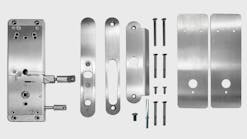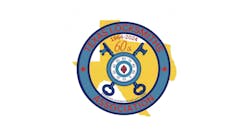Whenever I teach a class on investigative or forensics locksmithing, I’m asked, “how did you get into the business?”
In 2001, I worked full time as a detective for the Schererville, Indiana, Police Department. I also worked after-hours as an emergency locksmith who performed lockouts, simple rekeys and mechanical-key duplication. The only transponder vehicles I did were onboard-programmable General Motors vehicles.
Through my police investigations and basic locksmithing knowledge, I noticed that, sometimes, victim’s statements or evidence didn’t make sense. For example, in a case investigating the reported theft of a new Dodge vehicle from a Walmart parking lot, the alleged theft was caught on video after the owner entered the store. A suspect carrying nothing bigger than what would fit in the palm of their hand opened the vehicle, entered it and drove away in less than one minute.
I thought it looked too fast for most thefts, but I also knew the vehicle had an optional transponder system available. The next day, I had the investigator recover both original keys from the victim, who stated that these were the only keys for the vehicle. Both were gray transponder keys for the Dodge vehicle. Meanwhile, the dealer confirmed it was a transponder-equipped vehicle.
This was before cloning, tools that pulled programming pins and a multitude of inexpensive foreign-made programmers. The only thing out there at the time was the dealer tool and the Advanced Diagnostics family of programmers. In other words, the only way to get the vehicle PIN was through OEM dealers or a roadside-assistance vendor.
I notified the insurance company that we were looking into this more closely and explained my findings. They responded with, “We have a guy who specializes in that.”
A few days later, I was greeted by their investigator. He identified himself as a Certified Forensic Locksmith. He asked about my background, recognizing I knew more about transponders than most detectives, and recommended I look into investigative and forensic locksmithing.
Afterward, he joked about how easy the case would be because of my efforts. We then started discussing compensation: His one-day followup fee was more than my two-week police department salary at the time. I already had the knowledge, so I realized I could leverage this to increase my revenue. (As for the case, after being confronted with the evidence, the suspect admitted staging the theft and burning the vehicle for the insurance money.)
A Matter of Expertise
You don’t have to have a police background to be an investigative locksmith or an expert witness in a case. Think of your everyday job as a locksmith. How many times have you responded to a call and noticed signs that someone was there before you?
I invite you to review a few images and ask yourself what the photos reveal:
- You’re called to a vehicle lockout. (Images 1 & 2)
- You’re called to a residential rekey, because an unknown person is entering the home. (Image 3)
- A car lot calls to complain that the key falls out when driving the vehicle down the road. (Image 4)
Even a novice locksmith can recognize the potential problems with each of these situations: scratches from the use of a Slim Jim (Image 1), a dent from possibly a long-reach tool (Image 2), prying damage (Image 3) and a drilled-out ignition cylinder (Image 4).
As locksmiths, we make assessments like this every day: Why is a lock failing? Are there signs of tampering or bypass? Has someone already tried making a key for this vehicle? What can we do to make a building more secure?
This is investigative locksmithing, which is roughly the same thing as forensics locksmithing.
The International Association of Investigative Locksmiths (IAIL), which is a partner of ALOA, defines an investigative locksmith as “one who has a background in investigative techniques and possesses extensive knowledge of locks, locking mechanisms and high-security key systems and the methods used to bypass and/or defeat these locks.”
Who has extensive knowledge of locks, locking mechanisms and high-security key systems? You do.
Being referred to as an “expert” sometimes makes us feel uneasy. It’s natural to have peers whom we look up to or whom we believe might know more than we do. However, in general, as far as case law is concerned, an expert is someone who has more knowledge than the average person on a given topic or skill.
So ask yourself, “Do you have more knowledge than the average person about locksmithing?” The answer, of course, is yes. In other words, when it comes to locks, you’re an expert.
Getting into the Field
So, you already have the skills necessary to get into investigative or forensic locksmithing. All you have to do is find your way into the field. I would recommend several steps to take to help you to establish your credentials as an expert.
Back it up. It’s important to maintain records of all of your training and experience. It’s good practice to save all certificates on any training you have. Keep a journal in your records of every class or lecture you attend or teach. This will help you to prepare your “curriculum vitae” (C.V.). It’s Latin for “course of life,” and it’s more detailed and longer than a resume. A C.V. typically is at least several pages long, and it documents your knowledge, skills and experience. You should update it periodically, because it’s one of the first things you might be asked for when being considered for a case. There’s free information on the internet about different formats and ways to properly document and prepare a C.V.
Get certified. Becoming a Certified Forensic Locksmith (CFL) should be the goal of the investigative professional. IAIL is the only certifying body for the CFL. They define a forensic locksmith as “one who possesses all the knowledge of an investigative locksmith and has additional training in covert and clandestine techniques, the evidence left by these methods and the analysis of such evidence.”
Core classes are required as well as general and specialty classes for specific certifications, such as for automotive or safes. In working towards your certification, you’ll learn more about testifying as an expert witness, the “scientific method,” preparing C.V.s, photography, forensic techniques and more. Required classes typically are offered during the annual ALOA convention, and it will hold a slate of “investigative track” classes during the 2021 Florida convention scheduled for July 25–31. Go to www.aloa.org for more information.
Get out there. There are practical ways to get yourself out there as an expert available for work. With today’s social media, it’s easier than ever to get noticed, through LinkedIn, Facebook and Twitter. Introducing yourself to local insurance agents and investigators is another way to get noticed.
Recently, because of a rash of a specific vehicle thefts, I was asked to demonstrate how quickly I could enter and start a locked vehicle of that make. I shot a video demonstrating the process, which took 52 seconds to enter and start the proximity-equipped vehicle. This drew attention, and I then was asked to do a 15-minute Zoom training session for law enforcement. This was attended by more than 100 investigators and led to other inquiries. Although voluntary and not immediately profitable, the video will lead to more recommendations and establishment as an area expert.
Plus, these are all activities that can be listed on a C.V. So, stop by your local auto-theft unit or even small police department and offer to help them if they ever need it.
Get published. I have submitted and published articles to locksmith publications, investigator magazines and local newspapers. Articles don’t have to be investigative. They could be technical on installing a new type of lock or using a new type of tool. It also could be an article on an older technique or expertise that’s being lost to time. Many times our industry is looking for fresh information to publish. You also might get paid to write the article.
Published articles look good on a C.V. They help to establish you as an expert in your field. After all, what could be better than your locksmith peers taking the time to read what you have to say?
Become an instructor. Teaching for ALOA, IAIL or even your local or state association advances your status as an expert and helps to build up an impressive C.V. Teaching also helps to prepare you in the area of public speaking and responding to on-the-spot questions. This experience can help if you’re called to testify.
If investigations interest you, taking and documenting these steps can lead to new adventures, experiences and revenues in investigative locksmithing.
Brian VanDenburgh, CFL, CAL, CRL, CAI, has been the owner of Lockout Express Locksmith in Dyer, Indiana, since 1993. He also is a Just Cars instructor.






